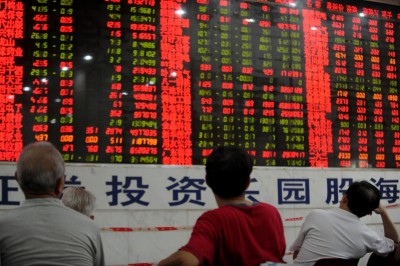Chinese Stock Market Suffers Biggest One-day Sell-off Since 2007

China’s stock market suffered its biggest one-day sell-off since 2007 on Monday, with share values plunging by more than 8.5 percent.
Panic selling triggered the automatic suspension of trading for over 1,000 companies, leading Chinese financial authorities to announce a new round of share purchases in an attempt to stop the rout. However, Chinese stock indexes continued to fall in early trading on Tuesday.
The plunge in the Chinese market sparked a global run on both stocks and commodities. Share prices in Europe fell by more than 2 percent. In the US, the Dow Jones Industrial Average fell 117 points, or 0.73 percent, while the tech-heavy Nasdaq declined by nearly 1 percent.
The Standard & Poor’s 500 stock index posted its first five-session loss since the beginning of the year, while the Dow hit its lowest level since February. Nearly 500 major US stocks hit 52-week lows Monday, the most in nearly a year. Nine out of 10 sectors of the S&P 500 closed down for the day, led by the energy sector, which fell by 1.35 percent.
Growing concerns over a slowdown in the Chinese and global economy sparked a further sell-off in commodities in tandem with the stock plunge. Oil prices hit a four-month low, while other commodities sensitive to economic growth, such as copper, fell to a six-year low.
Investors responded to the global decline by moving into safe-haven assets, including gold, whose price rose 1 percent, US Treasury bills, whose yields fell from 2.26 percent to 2.22 percent, and more conservative stocks such as utilities.
Monday’s panic selling occurred only weeks after the Chinese government injected some $800 billion into the country’s stock market, banned large shareholders from selling stock, stopped initial public offerings, and restricted short selling. These actions were temporarily successful in stopping the rout, helping the Chinese stock market recover in three weeks 14 percentage points of the 30 percentage points it had lost over previous weeks.
But even these measures appear to have exhausted themselves. Fortunemagazine, commenting on the most recent sell-off, declared, “The readiest explanation among analysts was that traders have lost faith that the government can slow the selling.”
Analysts noted that 60 percent of stocks listed on Chinese exchanges were suspended from trading Monday, meaning that the fall in share prices would have been much worse had trading in these stocks been allowed to continue.
Before the beginning of the decline in June, the Chinese stock market had increased in value by more than 150 percent over a single year, fueled by Chinese government efforts to boost share prices amid an economic slowdown.
There are indications that the collapse of China’s stock bubble is feeding back into the country’s real economy, with one significant purchasing manager’s index falling to a 15-month low over the weekend. China’s economic growth rate fell to 7.4 percent last year, the slowest pace in nearly a quarter century. The country’s economy is set to grow at a rate of 7.0 percent this year.
Corporate profits have continued to falter in China, with official figures released this week showing profits for industrial companies falling by 0.7 percent in the first half of the year.
Zhu Baoliang, director of the economic forecast department of a leading Chinese government research agency, told Reuters that the sell-off was having a significant impact on the real Chinese economy. He called on financial authorities to impose a further cut in interest rates.
The latest sell-off in China may indicate that the worsening state of the real economy internationally may be finding a reflection in global stock markets, which have become wildly inflated as a result of nearly seven years of near-zero interest rates by the Federal Reserve and other central banks. Earlier this month, the International Monetary Fund predicted that 2015 would be the worst year for global growth since 2009.
“There remain very few buyers out there and there are some growing concerns that we’re looking at a slowdown in global economic growth,” Sean Lynch of the Wells Fargo Investment Institute told the Associated Press.
Monday’s plunge in share values followed the announcement of a series of mass layoffs. On Friday, Anglo American, the world’s fifth largest mining company, said that it would slash over one-third of its workforce, eliminating 53,000 jobs in the coming year as a result of the fall in commodity prices. Last week, Qualcomm Incorporated announced 4,700 layoffs, following the announcement of 1,500 layoffs at Newport News Shipbuilding in Virginia and 1,200 layoffs at a Mitsubishi Motors plant in Normal, Illinois.
US corporations have announced significant declines in earnings and revenues for the second quarter of the year, making current stock prices appear even more overvalued. Reuters reported that “the S&P 500 is trading near 16.9 times forward 12-month earnings, above the 10-year median of 14.7 times.”

